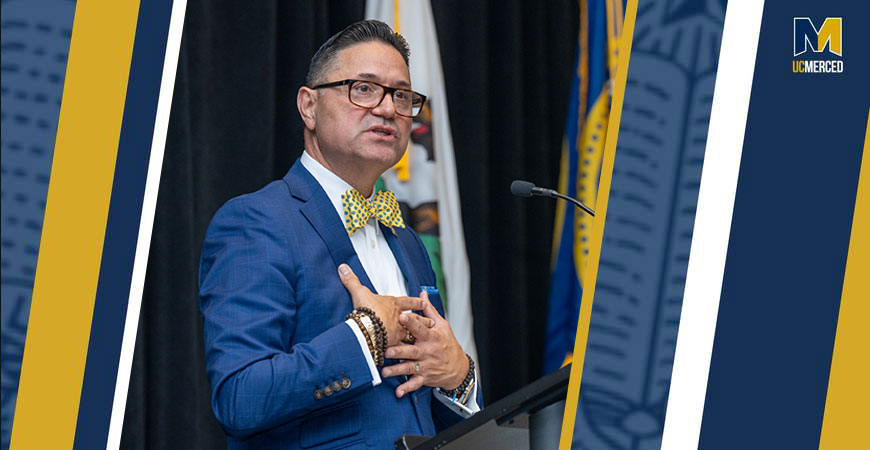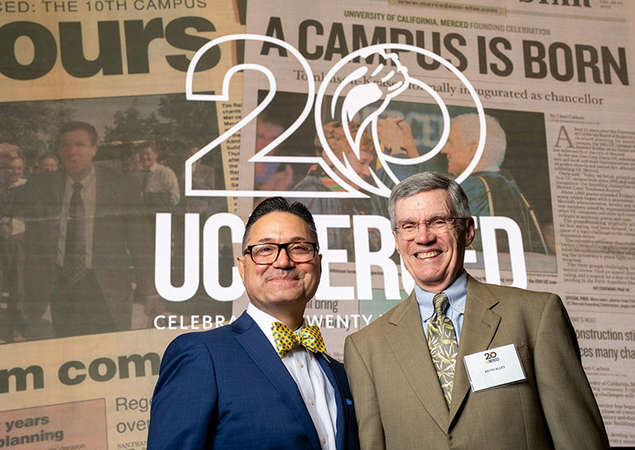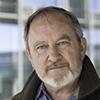
Only 20 years since undergraduate instruction began, UC Merced is a recognized leader in conducting academic research, developing young minds for career success and driving economic growth, the university’s chancellor said Wednesday.
Speaking to a gathering of campus and community leaders, along with members of the UC Merced Foundation Board of Trustees, Chancellor Juan Sánchez Muñoz delivered his annual State of the University address, honoring the pioneering spirit and can-do determination of the faculty, staff and students who celebrated the university’s grand opening in fall 2005.
Less than a handful of buildings were complete on a campus still bustling with construction workers. Most of the first classes were held in the library.
Muñoz said founding Chancellor Carol Tomlinson-Keasey, in an opening day address, told her audience that “UC Merced resolved to reach the high standards for education and innovation set by the University of California's previous nine campuses.
“The chancellor knew then, as I do now, that the people assembled to learn, to teach, to work and inquire at UC Merced have indeed been and remain categorically up to the task.”

Muñoz announced that one of UC Merced’s founding leaders made a generous contribution to the university’s future. Keith Alley and his wife, Jill, created an endowment with ongoing funding and pledged up to $2 million in support of undergraduate student research. Keith Alley was UC Merced’s first vice chancellor for research and graduate dean. He also served as provost from 2006 until his retirement in 2012.
Among the 20 years of firsts cited in the address:
-
UC Merced’s economic impact totals $1 billion annually in Merced County and nearly $1.4 billion in California, according to a new study. A soon-to-be-released report by Beacon Economics, commissioned by the university, said UC Merced supports 1 in every 15 jobs in the county and more than 8,600 jobs statewide. The university’s research enterprise generates $158 million in economic output in California, with every research dollar UC Merced invests in research doubling in economic activity.
-
UC Merced advanced in recent national college rankings. U.S. News & World Report placed the university 25th among public universities, and The Wall Street Journal ranked it 14th among all universities. Both reports placed UC Merced third for social mobility, which measures the improvement of students’ economic and social standing through knowledge, skills and opportunity.
-
More than 95 percent of the student body is Californian, including nearly 40 percent from the Central Valley. In addition, 65 percent of new students in the current semester are the first in their families to attend college.
-
The Merced Automatic Admissions Program, known as MAAP, offers a streamlined application to high school students who meet UC qualifications. Fresno Unified, the state’s third-largest school district, joined MAAP in September, adding to a list of about 40 districts statewide.
-
Earlier this year, UC Merced reached the nation’s highest status for public research universities, attaining the R1 classification from the Carnegie Foundation. The university also earned Carnegie’s new “opportunity” status for emphasizing access to underrepresented or low-income students and for producing graduates who earn significantly above expectations. Only 21 universities nationwide and three in California hold both classifications.
-
Other highlights from the chancellor included the growth of the Agricultural Experiment Station, the ongoing construction of the Medical Education Building and of the Promise Housing project for transfer students; and the start of the third cohort of students in the San Joaquin Valley PRIME+ pathway, designed to train physicians with Valley roots to practice in the region.
Muñoz returned to the remarks by Tomlinson-Keasey to draw a bright throughline from the promise of 2005 to the achievements of 2025.
“She said, ‘Our university will not be finished in 20 years, not in 50 years, not in many lifetimes. But let us begin,’” he said. “I am so very proud of what we have become at UC Merced. I am in awe of what we can be.
“As my predecessor said 20 years ago, I say again today: Let us begin.”




 Public Information Officer
Public Information Officer

